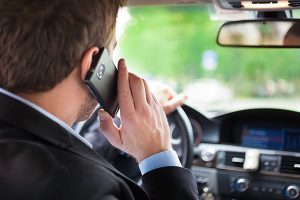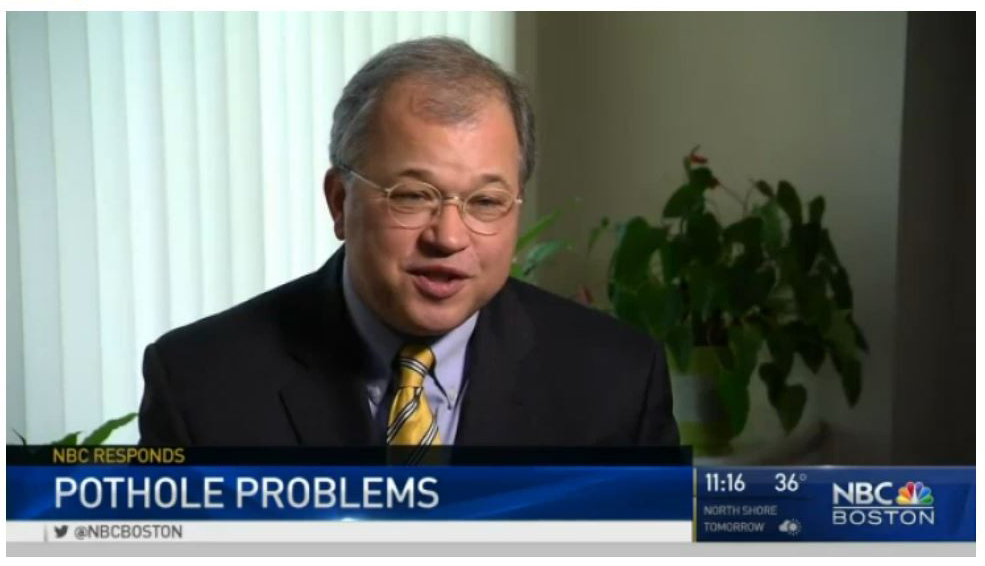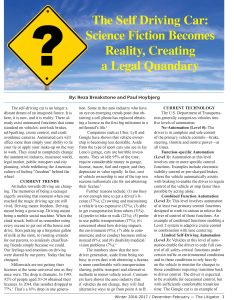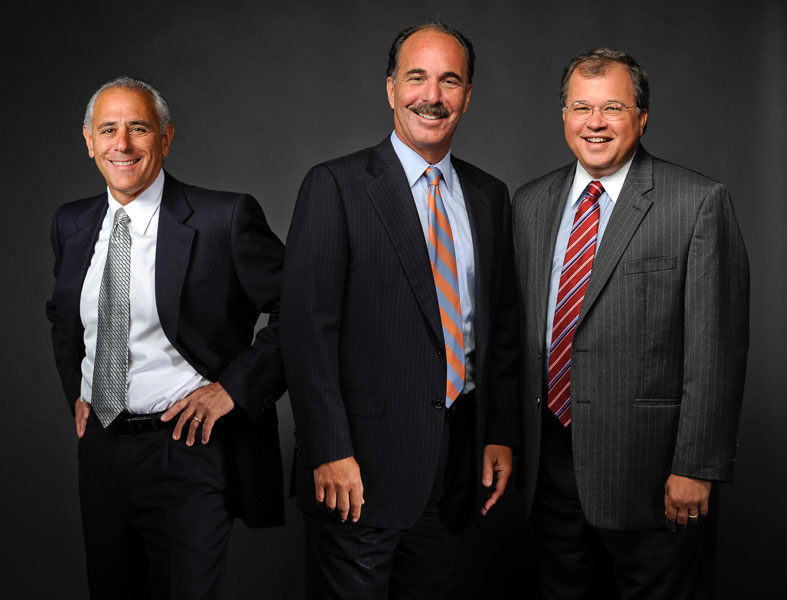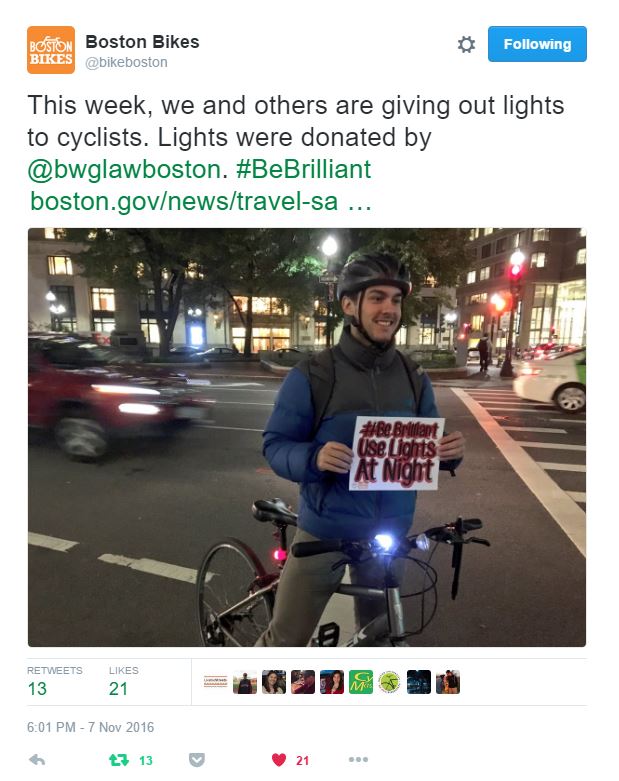Posts Tagged ‘Boston’
Will Massachusetts Pass a Handheld Cell Phone Ban for Drivers?
As attorneys, we have represented hundreds of victims of motor vehicle crashes over the past three decades. In recent years, we have seen texting while driving and cell phone use by drivers multiply at an alarming rate, causing a stunning number of injuries and deaths. These injuries are preventable, but each year, drivers continue to reach for their phones and the toll rises.
According to the US Department of Transportation, cell phones are now involved in 1.6 million auto crashes each year, injuring 500,000 people and causing 6,000 deaths. While many states have already passed legislation to reduce distracted driving accidents, some are now considering additional measures, including Massachusetts.
Massachusetts lawmakers passed the Safe Driving Law in 2010, which banned texting while driving. There was no further action until January 2016, when the Massachusetts state Senate passed a bill banning handheld cell phone use. The ban would have allowed drivers to use hands free technology to dial and talk. According to the State House News Service, the Massachusetts House of Representatives gave initial approval to a similar bill but the legislation stalled.
With Governor’s Comments, Handheld Cell Phone Debate Returns to the News
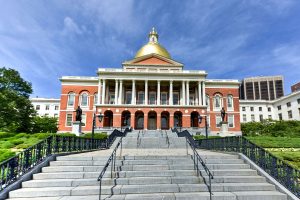 There was no update for several months. Then Governor Charlie Baker spoke in February, indicating he may not support a handheld ban.
There was no update for several months. Then Governor Charlie Baker spoke in February, indicating he may not support a handheld ban.
“I don’t want to get out of the business of making it possible for people to talk to other people when they’re driving. Because I think the texting thing is a big problem. I’m not sure I believe that the talking thing is,” Baker said during his “Ask the Governor” segment on WGBH Thursday. His comments were published by the State House News Service.
When the show’s co-host noted that drivers could use hands-free Bluetooth devices, Baker said:
“So now we’re just going to let people who can afford to put a Bluetooth in their new car to have the ability to talk when they’re in a car?” Baker responded. “But we’re not going to let anybody else? Hmm. Let me think about that one a little.”
Following the interview, The Boston Herald called on state lawmakers to resume their work to ban handheld cell phones: “Drivers in Massachusetts have proven that when it comes to using their phones behind the wheel they’re incapable of regulating themselves.”
When texting while driving was banned in 2010, texting was the major concern for distracted driving, the Herald wrote. Today, more people have smartphones which offer quick access to social media and other apps.
How Widespread is Texting While Driving in Massachusetts?
Critics say enforcement for Massachusetts’ texting while driving ban is challenging when drivers can hold their phones to talk, but not for other purposes. Police have worked through some of these issues. According to a Boston Globe analysis, Massachusetts police officers wrote 6,131 tickets in 2015, compared to 1,153 in 2011, the first year of the ban. Overall, between late 2010 and mid-April of 2016 when the analysis was published, 18,383 tickets were issued for texting while driving in Massachusetts.Drivers under 40 years old received the most tickets and many drivers got caught during Distracted Driving Awareness Month, when many local police departments receive safety grants for enforcement.
Where Proposed Legislation Now Stands in Massachusetts
Massachusetts is one of 46 states which have texting while driving laws. Just 14 states also ban handheld cell phone use, according to the National Conference of State Legislatures. New Hampshire, Vermont and Connecticut are among the early adopters.
Expect to hear more debate about a handheld cell phone ban in Massachusetts at some point in the future. While Governor Baker has voiced reservations, when the 2017-2018 legislative session began in January, the Massachusetts House of Representatives referred legislation for hands-free cell phone devices to the Legislature’s Joint Committee on Transportation.
Where to Find Distracted Driving Safety Campaigns and Information
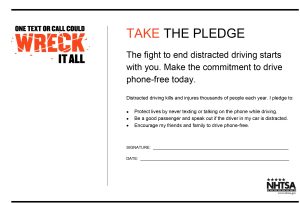
Safety campaigns are critical to preventing distracted driving accidents. There are many out there, offering programs for schools and information online. One effort is from the Massachusetts Academy of Trial Attorneys (MATA), which brings its “End Distracted Driving” program to high schools. We support this campaign. Two of our partners, Marc L. Breakstone and Ronald E. Gluck, serve on the MATA Board of Governors. Partner David W. White is a long-time member.
Another effort comes from the National Highway Traffic Safety Administration (NHTSA), which offers this pledge which family members can sign to promise each other they will not use a cell phone while driving.
Distracted Driving Prevention and Safety Campaigns:
Distraction.gov: Official U.S. website for distracted driving.
It Can Wait!: AT&T’s documentary to stop distracted driving.
Report: Dramatic Rise in Traffic Accidents in 2016
Driving on U.S. roads became more dangerous in 2016. Preliminary data from the National Safety Council shows more than 40,000 people died in motor vehicle crashes last year, a 6 percent increase from 2015.
- This was the first year more than 40,000 people have died in traffic accidents since 2007.
- According to The New York Times, 2015 and 2016 saw a 14 percent increase in traffic deaths, the largest two-year increase in more than half a century.
- In addition to deaths, an estimated 4.6 million people suffered serious injuries in car accidents last year. The total costs came to $432.5 billion, for motor vehicle deaths, injuries and property damages.
- In Massachusetts, 399 traffic deaths were reported in 2016, a 13 percent increase over the prior year (these are also preliminary figures).
The National Safety Council said lower gasoline prices and an improving economy may be helping to fuel the rise in traffic deaths. Others point to seat belt laws and texting while driving and other distracted driving behaviors.
If you drive, take to the roads safely. Follow the speed limit and make sure everyone in your family puts down their cell phone while driving.
Read our Article: Understanding and Buying Auto Insurance in Massachusetts
Until it happens to you, few people understand the costs associated with a car accident, and the toll on your physical health and emotional well-being. We hope you are never injured, but encourage you to read our article to protect yourself and your family.
Nine Pedestrian Accidents in One Day Highlights Need for Vision Zero, Other Safety Efforts in Boston
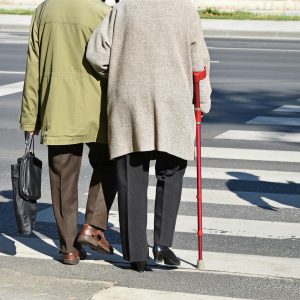 The Boston Herald has renewed concerns about pedestrian safety with a report that nine pedestrians were hit in Boston on the same day.
The Boston Herald has renewed concerns about pedestrian safety with a report that nine pedestrians were hit in Boston on the same day.
On Tuesday, January 17th, the city saw its worst day for pedestrian accidents since at least June 2015, according to a Herald analysis. The first pedestrian accident occurred at a McDonald’s restaurant on Massachusetts Avenue in the South End. This accident occurred shortly after 9:30 a.m. The other eight accidents occurred between 4:30 p.m. and about 9 p.m., in Dorchester, Jamaica Plain, Roxbury, Brighton and Hyde Park.
Pedestrian Accidents: The Numbers
Pedestrian accidents are a concern for everyone on the roads. In Massachusetts, we do a lot of walking. According to WalkBoston, more than 10 percent of all trips in Massachusetts are taken on foot (this is more than 40 percent greater than the national average).
When it comes to work, 12 percent of Massachusetts residents commute by walking. The number is higher in some communities. In Cambridge, 24 percent of residents walk to work.
According to the Boston Herald, pedestrian injuries are on the rise in Boston. In 2016, 904 pedestrians were injured in crashes, a 15 percent increase over 2015. Twelve pedestrians died in 2016, up from nine in 2015.
Mayor Marty Walsh has formed a Vision Zero task force with a goal of eliminating fatal and serious traffic fatalities in Boston by 2030. As part of the Vision Zero work, the city lowered its default speed limit from 30 mph to 25 mph in early January. The change does not impact state-owned roads. If you live or work in Boston, learn more about Boston’s speed limit change.
Pedestrian Safety Tips
Use Sidewalks. The sidewalk is the safest place for pedestrians. If no sidewalks are available, walk on the left side, against traffic so that drivers have a chance to make eye contact with you.
At Night. Carry a flashlight and wear a reflective safety vest if you walk at night or in the early morning.
Use Crosswalks and Traffic Signals. Use crosswalks and press the Walk button when available. Drivers are required to stop for you under Massachusetts law. Other cars are not allowed to pass the stopped vehicle.
Pay Attention to Safety Alerts. Winter is a harsh time for pedestrians. Pay attention to safety alerts and travel warnings from the State of Massachusetts, the MBTA, public schools, communities and your employers.
Beware of Snowbanks and Snowplows. Tall snowbanks obstruct the view between drivers and pedestrians. Wear a neon safety vest if you must walk in travel in these areas and pay attention to traffic. After a storm, expect to see snowplows on streets and working in parking lots. Take it slow.
Beware of Construction Areas. Areas such as North Station in Boston are now much harder for pedestrians to travel due to construction. Pay attention to notices about construction schedules and avoid building activity and construction workers whenever possible.
Watch for Cars Backing Up. Pedestrian accidents can happen when drivers neglect to check for pedestrians as they pull out of a parking space or a driveway. Watch out for these drivers and stop to let them back out.
From Breakstone, White & Gluck’s Experience
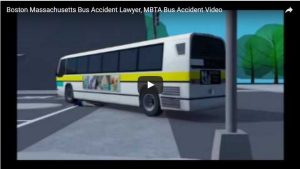 Our attorneys have over 100 years combined experience representing pedestrians who have been injured by the negligence of drivers and defective roadway conditions. Our law firm represented one pedestrian who was struck by a MBTA bus in a crosswalk in 2005. The pedestrian suffered serious injuries and required amputation of her right leg. The case went to trial and was appealed by the MBTA. The final award was $7.1 million for our client. See the re-enactment video we prepared for trial. It shows one way pedestrians can be put at serious risk.
Our attorneys have over 100 years combined experience representing pedestrians who have been injured by the negligence of drivers and defective roadway conditions. Our law firm represented one pedestrian who was struck by a MBTA bus in a crosswalk in 2005. The pedestrian suffered serious injuries and required amputation of her right leg. The case went to trial and was appealed by the MBTA. The final award was $7.1 million for our client. See the re-enactment video we prepared for trial. It shows one way pedestrians can be put at serious risk.
Attorney David W. White Is Interviewed for NBC Boston Story on Pothole Damage and Car Accidents in Massachusetts
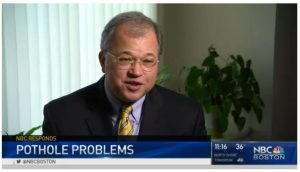 Just as sure as it brings snow, winter in Massachusetts always brings potholes. When drivers hit potholes, their cars can sustain major damage, sometimes totaling in the thousands of dollars. They often want to file a claim against the state or community which maintains the road.
Just as sure as it brings snow, winter in Massachusetts always brings potholes. When drivers hit potholes, their cars can sustain major damage, sometimes totaling in the thousands of dollars. They often want to file a claim against the state or community which maintains the road.
NBC Boston recently aired a story on what rights consumers have if their vehicle is damaged by a pothole (1/24/2017). Attorney David W. White was interviewed and delivered bad news for drivers. Under Massachusetts law, drivers do have 30 days to file a claim against a town or state. But drivers are unlikely to recover any money because the state and towns will claim “contributory negligence.”
“If you are one percent at fault, you get zero percent recovery,” he said.
We encourage you to watch the segment here: http://tinyurl.com/zlt8kvo.
About Breakstone, White & Gluck
The Boston car accident lawyers at Breakstone, White & Gluck are experienced at handling auto accident claims involving serious injury. If you have been injured, learn your rights. For a free legal consultation, contact us today at 800-379-1244 or 617-723-7676 or use our contact form.
Do You Have Insurance for Your Drone?
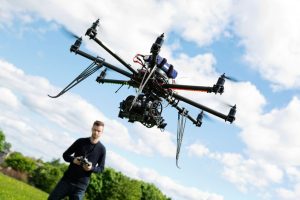 More than a million drones were sold this holiday season. If one happened to land in your pile of presents, remember that taking to your neighborhood skies comes with responsibilities. We offer a few reminders about insurance and protecting yourself from financial liability if there is injury or property damage. As a drone operator, you want to make sure that you will be able to pay for damages or personal injury that was caused by your negligence.
More than a million drones were sold this holiday season. If one happened to land in your pile of presents, remember that taking to your neighborhood skies comes with responsibilities. We offer a few reminders about insurance and protecting yourself from financial liability if there is injury or property damage. As a drone operator, you want to make sure that you will be able to pay for damages or personal injury that was caused by your negligence.
Homeowners and Renters Insurance. Start by reviewing your homeowners and renters insurance policies. Then speak to your insurance agent to learn if drone-related accidents are covered.
According to the Insurance Information Institute, drones are most likely covered under these policies. The liability portion of your homeowners insurance may cover you in lawsuits for bodily injury or property damage. Your policy may also provide no-fault medical coverage if someone is accidentally injured by your drone. But there are limits; medical bills for you and family members may not be covered by no-fault medical coverage.
Another reason to have insurance for your drone: If your drone causes bodily injury or property damage, and a claim is brought against you, proper insurance will not only cover the damages; the insurance company will also provide a lawyer to defend the claim against you.
Check with your insurance agent. The insurance industry is actively discussing this topic. Already, some insurers may exclude drone-related accidents from homeowners insurance policies. Others may choose to do so in the future.
Car Insurance. Your auto insurance policy may cover property damage resulting from crash landings or related accidents. Ask your auto insurance agent.
Commercial Users. If you operate a drone for business (even for a part-time business), you should ask your agent if you are covered. This would not typically be covered under your homeowners insurance policy.
Safety Reminders. Never use your drone recklessly and always follow current safety regulations. Drone owners are required to register drones with the FAA and fly at or below 400 feet. Failure to do so could result in a fine. To learn more, watch this safety video from the FAA.
Theft. Consider theft insurance if it make sense. Some drones are small and can be easily stolen. But remember many homeowners have to pay a deductible if they file a claim. If you own an inexpensive drone it will likely be less than your deductible. Maybe it was time to upgrade to the fancier drone anyway.
Memberships. If you do not have adequate coverage, consider your options. You may be able to buy more insurance coverage from your carrier or research other insurance carriers. You may also qualify for coverage if you belong to a membership organization or club. The New York Times reported the Academy of Model Aeronautics offers group liability coverage as part of its $75 per year membership. This may pay for damages after your homeowners insurance policy is exhausted.
Time to Get Started
If you are a drone owner, we hope you take the time to check with your insurance agent so you understand your potential liability. Drone crashes can happen on your property or a neighbor’s property and you want to be prepared.
Here are two resources:
“Getting a Drone as a Gift? Check Your Insurance,” New York Times.
Massachusetts Law: Property Owners Have Responsibility to Keep Their Property Reasonably Safe from Snow and Ice Hazards
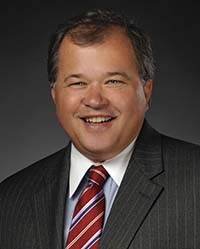 Many of us would rather skip the shovels, snowblowers and ice scrapers this winter. But when the snow falls, remember that Massachusetts property owners have a responsibility to keep their property reasonably safe. So your shovel must come out.
Many of us would rather skip the shovels, snowblowers and ice scrapers this winter. But when the snow falls, remember that Massachusetts property owners have a responsibility to keep their property reasonably safe. So your shovel must come out.
For over 100 years, Massachusetts property owners enjoyed a special exemption from liability for “natural accumulations” of snow and ice. An injured person previously had to demonstrate that the accumulation was unnatural, such as the frozen discharge from a gutter, or a pile of plowed snow across a sidewalk. But for the past six years, Massachusetts has followed the rule of reasonable care.
All residential and commercial property owners now have to take reasonable steps to clear the snow and ice hazards and keep their property safe for traveling.
Massachusetts started following the rule of reasonable care after the Supreme Judicial Court of Massachusetts ruled in the case of Papadopoulos v. Target Corp., 457 Mass. 368 (2010).
Attorney David W. White has written on the rule, discussed the case in the media and participated in MCLE panels on property owners’ liability in snow and ice cases.
“Property owners must understand it is no longer optional to shovel so you should get out there early and keep up with it,” White said.
Read Attorney White’s comments in The Boston Globe, Boston Business Journal and the Allston-Brighton Tab newspaper.
About Attorney David W. White
Attorney David W. White has distinguished himself for his advocacy on behalf of his clients and his leadership among Massachusetts lawyers. Attorney White is a past president of the Massachusetts Bar Association who has represented clients injured in personal injury cases for over 30 years. He has been selected as one of the Top 100 Super Lawyers in New England and Top 100 Super Lawyers in Massachusetts. Read more about Attorney David W. White.
About Breakstone, White & Gluck
The Boston personal injury lawyers at Breakstone, White & Gluck have over 100 years combined experience representing individuals who have been seriously injured in slip and fall accidents and snow and ice accidents caused by a property owner’s negligence. If you have been injured, it is important to learn your rights. For a free legal consultation, contact us at 800-379-1244 or 617-723-7676 or use our contact form.
Attorney Reza Breakstone Co-Authors Article on Legal Ramifications of Self-Driving Cars in California Lawyers Publication
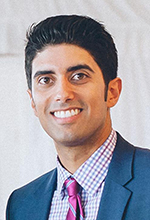 Attorney Reza Breakstone writes about the legal ramifications of self-driving cars in an article published in the Winter 2016-2017 edition of The Litigator, the official publication of the Capital City Trial Lawyers Association in Sacramento, California. Attorney Breakstone co-authored the article with Attorney Paul Hoybjerg of Roseville, California. In the article, “The Self Driving Car: Science Fiction Becomes Reality, Creating a Legal Quandary,” the authors write the time has come for the self-driving car.
Attorney Reza Breakstone writes about the legal ramifications of self-driving cars in an article published in the Winter 2016-2017 edition of The Litigator, the official publication of the Capital City Trial Lawyers Association in Sacramento, California. Attorney Breakstone co-authored the article with Attorney Paul Hoybjerg of Roseville, California. In the article, “The Self Driving Car: Science Fiction Becomes Reality, Creating a Legal Quandary,” the authors write the time has come for the self-driving car.
“The self-driving car is no longer a distant dream of an imagined future. It is here, it is now, and it is reality. There already exist automated functions that come standard on vehicles: anti-lock brakes, self-parking, cruise control, and crash avoidance cameras. Automated cars will affect more than simply your ability to tie your tie or apply your make-up on the way to work. They stand to completely change the automotive industry, insurance world, legal market, public transport and city planning, while redefining the American culture of feeling “freedom” behind the wheel.”
The article explains the current levels of automation among vehicles on the market, investments in the industry and ramifications for auto insurers and plaintiffs and defendants in personal injury cases.
“The less thrilling ramifications may be to the bottom line of auto insurers and the plaintiffs’ and defense bars in personal injury cases. Currently, auto insurance premiums account for $200 billion nationwide. The insurance industry, with decreased vehicle ownership and decreased liability issues on the part of the user, will find itself cut out of the equation. Allstate Corp. Chairman Thomas Wilson predicts that driverless cars will have “the most detrimental impact on auto insurance” and one “we don’t want to wait” to figure it out.”
About Attorney Reza Breakstone
Attorney Reza Breakstone joined Breakstone, White & Gluck as an associate in 2015. Learn more about Reza on our website.
Attorney Marc L. Breakstone Quoted in Massachusetts Lawyers Weekly Article on Antiquated Sidewalk Liability Laws
Attorney Marc L. Breakstone was quoted in a front-page Massachusetts Lawyers Weekly article about common law liability for injuries caused by sidewalk defects. The current common-law standard dates back centuries and prohibits many plaintiffs from recovering compensation for injuries. But a recent Appeals Court ruling may have finally set the stage for change.
Attorney Breakstone welcomes the idea. “I think that the common law is a living body of principles that has to evolve as social conditions and the realities of life evolve,” he said.
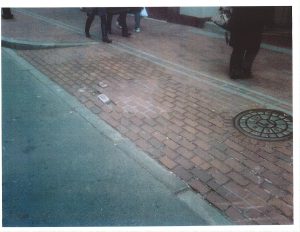 Earlier this month, the Appeals Court ruled in the case of Halbach, et al. v. Normandy Real Estate Partners, et al., concurring that a Superior Court judge had correctly granted summary judgment to the defendant, 100 & 200 Clarendon LLC, which operated, leased and maintained the John Hancock Tower and a neighboring garage in Boston.
Earlier this month, the Appeals Court ruled in the case of Halbach, et al. v. Normandy Real Estate Partners, et al., concurring that a Superior Court judge had correctly granted summary judgment to the defendant, 100 & 200 Clarendon LLC, which operated, leased and maintained the John Hancock Tower and a neighboring garage in Boston.
The Appeals Court rejected the plaintiffs’ argument that the defendant had been negligent in keeping the sidewalk free from defects and had failed to uphold their duty “to ensure a safe pedestrian walkway.”
The Appeals Court said the plaintiffs were suggesting “an entirely new duty” not recognized by state common law. The Appeals Court further noted that there is no affirmative duty to inspect and repair public sidewalks or notify the city.
In Massachusetts, cities generally have limited liability of $5,000 for personal injuries and property damage from defective ways, which also leaves plaintiffs who are injured with limited remedy.
Next Steps
In 2009, a man fell on uneven sidewalk after leaving his office at the John Hancock Tower in Boston. He suffered a bilateral rupture of his quadriceps tendon. After the fall, the defendant, 100 & 200 Clarendon LLC, did make some repairs, with no attempt to seek reimbursement from the city of Boston.
The man and his wife filed a lawsuit in Suffolk Superior Court in February 2012 and filed a motion for summary judgment in January 2014.
Appeals Court Judge James R. Milkey wrote that “the plaintiffs have a more forceful case for … a change in the law than the majority opinion suggests.”
The Supreme Judicial Court could now review the Appeals Court ruling and decide whether to extend a duty for sidewalks to private owners.
Attorney Breakstone told Massachusetts Lawyers Weekly this would be a “baby step for the evolution of our tort law.” It is a widely accepted principle that businesses making a profit from the customers they attract onto their premises have to provide safe egress, he said.
In 2010, the Supreme Judicial Court decision in Papadopoulos v. Target Corp. abolished the common-law distinction between natural and artificial accumulation of snow and ice. In Massachusetts, property owners are now responsible for clearing all areas of their property under the standard of “reasonable care,” regardless of whether they created the snow pile or if it naturally formed.
Read the full article on the Massachusetts Lawyers Weekly website. Subscription required for access.
About Attorney Marc L. Breakstone
Marc L. Breakstone has established a reputation as one of the top medical malpractice and personal injury lawyers in New England. His record-setting settlements and verdicts have earned him the distinction of being selected as one of the Top 100 Super Lawyers in New England and Top 100 Super Lawyers in Massachusetts. He has also been selected by his peers as one of the top medical malpractice plaintiff’s lawyers in the Super Lawyer balloting. In 2002, Attorney Breakstone was honored as one of ten “Lawyers of the Year” by Massachusetts Lawyers Weekly. More on Marc Breakstone.
About Breakstone, White & Gluck
The Boston personal injury attorneys at Breakstone, White & Gluck have over 100 years combined experience handling personal injury and premises liability cases for those who have been seriously injured. If you have been injured, it is important to learn your rights. For a free legal consultation, contact us at 800-379-1244 or 617-723-7676 or use our contact form.
Breakstone, White & Gluck Attorneys Named to Top 100 New England Super Lawyer List, Top 100 Massachusetts Super Lawyer List
Congratulations to attorneys Marc L. Breakstone, David W. White and Ronald E. Gluck for being selected to the 2016 Super Lawyers lists. This is the 13th year our firm has been recognized by Super Lawyers for being among the best in New England at obtaining justice for those who have been injured by negligence in personal injury and medical malpractice cases.. Together, our three partners have over 100 years combined experience practicing law in Massachusetts. Here is how they were honored:
Attorney Marc L. Breakstone
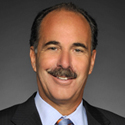 Congratulations to Attorney Breakstone who was named a Top 100 New England Super Lawyer and a Top 100 Massachusetts Super Lawyer for 2016. Attorney Breakstone specializes in representing plaintiffs in medical malpractice and personal injury cases and has practiced in Boston for 30 years. For the 13th year, Attorney Breakstone was also recognized as as a Massachusetts Super Lawyer in the area of medical malpractice for plaintiffs (2004-2016). This is his 10th year on the Top 100 Massachusetts Super Lawyers list. He was selected as a Top 100 New England Super Lawyer for the fifth time.
Congratulations to Attorney Breakstone who was named a Top 100 New England Super Lawyer and a Top 100 Massachusetts Super Lawyer for 2016. Attorney Breakstone specializes in representing plaintiffs in medical malpractice and personal injury cases and has practiced in Boston for 30 years. For the 13th year, Attorney Breakstone was also recognized as as a Massachusetts Super Lawyer in the area of medical malpractice for plaintiffs (2004-2016). This is his 10th year on the Top 100 Massachusetts Super Lawyers list. He was selected as a Top 100 New England Super Lawyer for the fifth time.
Attorney David W. White
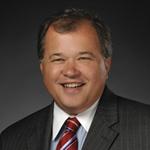 Congratulations to Attorney David W. White, who was named a 2016 Massachusetts Super Lawyer in the area of personal injury, plaintiff representation. This is the 13th year he has been recognized for excellence among Massachusetts and New England lawyers. Attorney White has been selected to the Top 100 New England Super Lawyers list three times and to the Top 100 Massachusetts Super Lawyers list seven times.
Congratulations to Attorney David W. White, who was named a 2016 Massachusetts Super Lawyer in the area of personal injury, plaintiff representation. This is the 13th year he has been recognized for excellence among Massachusetts and New England lawyers. Attorney White has been selected to the Top 100 New England Super Lawyers list three times and to the Top 100 Massachusetts Super Lawyers list seven times.
Attorney White is a past president of the Massachusetts Bar Association and has practiced law in Boston for over 30 years. He has distinguished himself for his advocacy on behalf of his clients and his leadership among Massachusetts lawyers. Attorney White represents clients in all types of personal injury and insurance cases, including bicycle accidents, pedestrian accidents, motor vehicle accidents, product liability and dog bite cases.
Attorney Ronald E. Gluck
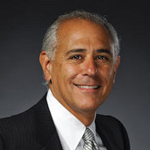 Congratulations to Attorney Ronald E. Gluck, who was named a 2016 Massachusetts Super Lawyer in the area of personal injury, plaintiff representation. Attorney Gluck has been consistently recognized for excellence by Super Lawyers for 11 years. Attorney Gluck has practiced law in Boston for over 35 years and specializes in handling cases involving pedestrian accidents, bicycle accidents, motor vehicle accidents and motorcycle accidents.
Congratulations to Attorney Ronald E. Gluck, who was named a 2016 Massachusetts Super Lawyer in the area of personal injury, plaintiff representation. Attorney Gluck has been consistently recognized for excellence by Super Lawyers for 11 years. Attorney Gluck has practiced law in Boston for over 35 years and specializes in handling cases involving pedestrian accidents, bicycle accidents, motor vehicle accidents and motorcycle accidents.
About Super Lawyers
Super Lawyers is a multiphase selection process which rates attorneys in every state. The top 5 percent of attorneys are selected to Super Lawyers lists.
How the process works: Peer nominations and evaluations are combined with independent research by Super Lawyers, which is part of the Thomson Reuters company. Lawyers are evaluated on 12 indicators of peer recognition and professional achievement on an annual, state-by-state basis. The company’s objective is to create a credible, comprehensive and diverse listing of outstanding attorneys which can be used as a resource for other attorneys and consumers searching for legal counsel.
Super Lawyers listings are printed annually in Boston Magazine and are available on the Super Lawyers website. Read More
Breakstone, White & Gluck Donates 500 Bicycle Light Sets to Boston Cyclists
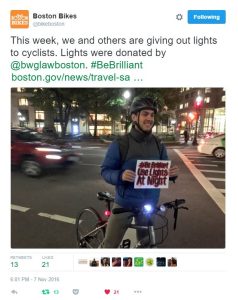 Breakstone, White & Gluck is teaming up with Boston Bikes, the City of Boston and cycling groups this week to remind cyclists to use bike lights. All over the city, cyclists are being surprised with free lights (if they need them), as part of Boston Bikes’ #BeBrilliant campaign to keep cyclists safe.
Breakstone, White & Gluck is teaming up with Boston Bikes, the City of Boston and cycling groups this week to remind cyclists to use bike lights. All over the city, cyclists are being surprised with free lights (if they need them), as part of Boston Bikes’ #BeBrilliant campaign to keep cyclists safe.
Breakstone, White & Gluck donated the 500 bicycle light sets to Boston Bikes, which is part of the City of Boston, for the third year. Boston Bikes staff and volunteer groups have been giving the lights away this week in Dorchester, Allston, Brighton, Dorchester, East Boston, Mattapan, Roxbury, South Boston and Downtown. Groups include Rozzie Bikes, Commonwheels Bicycle Collective and Bike Dorchester.
Under Massachusetts law, cyclists must use bike lights to help them stay visible to motorists. Cyclists must have a white light on the front of their bike and either a red light or a red reflector on the rear. This is an important reminder since Daylight Saving Time ended last weekend and the nights are getting darker earlier.
“As evenings get dark earlier, people who are driving, walking and bicycling need to be more aware of each other than ever,” said BTD Commissioner Gina N. Fiandaca, in an announcement posted on the city’s website. “Our top priority is ensuring the safety of people traveling on our streets, and we ask everyone to help us by slowing down and looking out for each other.
Here are a few safety tips for drivers, pedestrians and cyclists.
For Drivers
- Follow the speed limit
- Do not use cell phones
- Always yield to pedestrians
- When turning, slow down and look for bicyclists going straight
- Make sure you do not open your car door into the path of a bicyclist or another driver
- Do not park or stop in the bike or bus lane
For Pedestrians
- Always use crosswalks
- Avoid crossing the street between two parked cars
- Wear reflective colored clothing
For Bicyclists
- Always wear a bicycle helmet and use bike lights
- Bike in the same direction as traffic, unless the street is marked otherwise
- Stop at stop signs and follow all traffic signals
- Wear reflective colored clothing
- Use hand signals
- Yield for pedestrians


